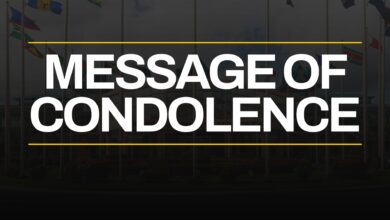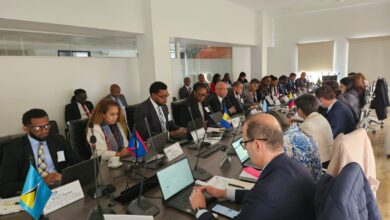Sir Frederick Ballantyne, Governor General of St. Vincent and the Grenadines
Members of the Cabinet of St. Vincent and the Grenadines
Hon. Foreign Ministers
Members of Parliament
Other Heads of Delegations
Members of the Diplomatic Corps
Members of the Judiciary
Members of the Clergy
Senior Government Officials
Members of the Media
Ladies and Gentlemen
It is a pleasure to be in this beautiful, serene and idyllic Member State St Vincent and the Grenadines for the Sixth Meeting of the Council for Foreign and Community Relations (COFCOR). It is a perfect backdrop of tranquility for the intense work to be undertaken over the next couple days.
Ladies and Gentlemen, this Meeting of the COFCOR has a formidable task before it, given the many burning regional and international issues to which the Community looks to the COFCOR for guidance. Additionally, at this juncture in history, as we celebrate out 30th Anniversary as a Community, not only are our Heads of Government looking forward to the incisive analysis and advice of the Region’s Foreign Ministers, but the decisions emanating from this Meeting, within which the Community’s policy positions will be framed in the main, are also being closely followed by our neighbours and friends far and wide. More and more, the interconnectedness of the global community requires that small countries like ours embrace the opportunities presented to advance our interests and values, together with like-minded states, small or large, bilaterally, en bloc or in a multilateral setting.
Since the last regular meeting of this distinguished body one year ago in Saint Lucia, the Community has completed a dynamic schedule of engagements with a significant part of the global community. This included the United States, Canada, the European Union, Spain, Japan, the Russian Federation, the African and Pacific countries within the ACP-EU context, the Rio Group, and closer to home, Cuba, and Costa Rica. The Community also welcomed the demonstration of interest by Mercosur for closer trading relations and on a similar basis, looks forward to exploring opportunities for developing strong cooperation linkages with the Region’s Overseas Departments of France Guadeloupe and Martinique.
The Community also expended considerable attention and resources on its newest member state, Haiti, as it continued its active involvement in joint missions with the Organisation of American States (OAS) to resolve the political and electoral stalemate in that Member State.
Indeed, I wish to commend the outgoing Chairman of the Council for Foreign and Community Relations – the Honourable Julian R. Hunte – for his indefatigable energy, commitment and leadership to this process as co-head of the OAS/CARICOM Missions to Haiti and as Outgoing Chairman of the Council for Foreign and Community Relations. The Region is justifiably proud to have him as its candidate for the Presidency of the 58th Session of the United Nations General Assembly (UNGA), a position for which both his political and diplomatic experience eminently qualifies him.
While CARICOM has had a full and productive year this has not been without its challenges. Member States’ economies were still recovering from the fallout of 9/11 when the strike in Venezuela at year’s end followed by the hostilities in Iraq provoked significant volatility in energy prices and further exacerbated the difficulties of the air transportation and tourism sectors, the latter being a principal contributor to the economic well-being of many member states. In the international negotiating theatres, the Community faced a serious threat with the challenge being launched to the EU Sugar Regime at the WTO by two powerful countries.
Ladies and gentlemen, while the focus of this meeting will be on regional and international issues, these cannot be addressed in a context distinct from internal Community matters, specifically operationalisation of the CARICOM Single Market and Economy (CSME). Considerable advances have been made towards this end. At the Fourteenth Inter-Sessional Meeting of the Conference in February this year in Trinidad and Tobago, Heads of Government agreed that Member States in a position to accelerate the implementation of the defining elements of the CSME should do so by December 2004. The process of establishing the Caribbean Court of Justice (CCJ) is also well advanced – measures aimed at setting up the Regional Judicial and Legal Services Commission have been approved by CARICOM Heads of Government and it is envisaged that the CCJ will be inaugurated in the second half of this year – a November date being the most likely.
A key related factor in this last year’s work for this organ of the Community was the endorsement by CARICOM Heads of Government, at the Twenty-third meeting of the Conference, of the revised foreign policy strategy of the Community. There, COFCOR’s role in the successful establishment of the CSME has been spelt out. This strategic framework will underpin efforts to achieve one of the main objectives of the Community namely the “enhanced coordination of Member States’ foreign and foreign economic policies” as provided for under the Revised Treaty of Chaguaramas establishing the Caribbean Community including the CARICOM Single Market and Economy.
A key element in implementing the revised foreign policy strategy of the Community is the pivotal role to be played by the Bureau of the COFCOR particularly in the intervening periods between meetings of this parent body. The usefulness of this mechanism cannot be overemphasized. Given the current pace at which regional and international events occur, followed by rapidly changing developments, added to the challenges of existing communications infrastructure to receive the urgent views of fifteen member countries, the COFCOR Bureau has a principal role to play in steering the ship with a “skeleton crew” as it were, until all hands can be on deck. The First Meeting of the Bureau in early February this year proved how very critical this mechanism is. The Secretariat will continue to give its full support to the Bureau, in the exercise of its mandate as outlined in the Community’s revised foreign policy strategy.
Ladies and Gentlemen, this revised foreign policy strategy, emphasizing as it does democracy, respect for human rights and the strengthening of the mechanisms of co-ordination among our Member States, lies at the heart of our existence as a Community, and could hardly have been forged at a more relevant time. As our Heads of Government reaffirmed last month in relation to the fall out from the Iraq conflict: “The Caribbean Community, as a grouping of small states and an integral part of the international community, must continue to rely heavily on the United Nations, the primacy of international law, and adherence to international obligations for the protection of its sovereignty, territorial integrity and the furtherance of its interests.”
Within those words lie the kernel of what must be characteristic of our approach to our development and international interaction at this critical time of world history.
Honourable Ministers, Ladies and Gentlemen, amidst the celebrations of our 30th Anniversary, we must pause to remember the passing of one of the icons of the liberation struggle of South Africa and a man whose influence transcended the future of his country’s fortunes. I refer to the late Walter Sisulu, father of the African National Congress.
It would be remiss of us if we were not to mark his passing and to convey to his family, the Government and people of South Africa, our deepest sympathy on this occasion.
Honourable Ministers, I trust that the COFCOR’s deliberations over the next days will bear much such fruit. Our hosts have left no stone unturned to support these endeavours. For this we are very appreciative indeed.
Honourable Ministers, with these few words, it is now my pleasure as Secretary-General of the Caribbean Community to invite Senator the Honourable Julian R Hunte, Minister of External Affairs, International Trade and Civil Aviation of Saint Lucia, that Helen of the West, and outgoing Chairman of the Council for Foreign and Community Relations, to address you.





